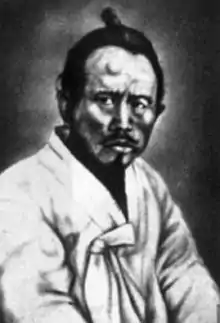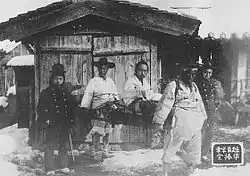Jeon Bong-jun
Jeon Bong-jun (1855 – 1895) was born in Taein, Jeollabuk-do, Korea. He was a prominent leader of the Donghak Peasant Revolution. Due to his short physical stature, he was called "Nokdu Janggun" (녹두장군, General mung bean).
| Jeon Bong-jun | |
 Jeon Bong-Jun | |
| Korean name | |
|---|---|
| Hangul | 전봉준 |
| Hanja | |
| Revised Romanization | Jeon Bong-jun |
| McCune–Reischauer | Chŏn Pongjun[1] |
| Art name | |
| Hangul | 해몽 |
| Hanja | |
| Revised Romanization | Haemong |
| McCune–Reischauer | Haemong |
| Courtesy name | |
| Hangul | 명숙 |
| Hanja | |
| Revised Romanization | Myeongsuk |
| McCune–Reischauer | Myŏngsuk |
Struggle and revolution
In 1894 Jeon Bong Jun and other farmers pleaded with a local magistrate of Jeolla Province to lift the heavy (and some say illegal) taxes and to return extorted property taken from people accused of unsubstantiated crimes. This plea of Jeon Bong Jun and the others was rejected. In reaction to this rejection he, along with other farmers, revolted and attacked the county office and threatened to punish corrupt officials if they did not cease all corruption.
End of revolution

On April 28, 1894, Jeon Bong Jun's revolution became anti-Western and anti-Japanese because of the oppressive and brutal actions of the Japanese army in punishing the Korean farmers. This revolution spread from town to county as the peasant army vowed to eradicate the entirety of the Korean ruling class and expel all Japanese and western parties. By September his peasant revolt came to a violent end as his army of farmers were decisively defeated by a well trained, better equipped Japanese military in the Battle of Ugeumchi. Jeon Bong-jun was arrested by the governor of Jeolla province, Yi Do-jae,[2] and was executed by hanging on 24 April 1895.
Cultural depictions
- Portrayed by Choi Moo-sung in the 2019 SBS TV series Nokdu Flower.
- There is a statue of Jeon Bong Jun in Seoul, at the intersection of Jong-ro and Ujeongguk-ro.
Notes
- Also written Chon Bong-joon
- Veritable Records of the Joseon Dynasty. "전라 감사가 비적의 두목인 전봉준을 사로잡았다고 보고하다".
External links
- (in Korean) 전봉준 全琫準 at the Empas / EncyKorea
- Gongju official visitor cite
- The Independence Hall of Korea
- clickkorea.org
Further reading
Lew, Young Ick. "The Conservative Character of the 1894 Tonghak Peasant Uprising: A Reappraisal with Emphasis on Chŏn Pong-jun's Background and Motivation." Journal of Korean Studies 7, no. 1 (1990): 149-80.